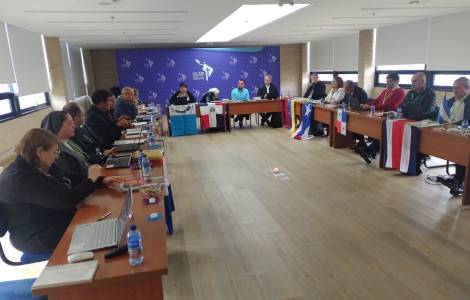
Bogota (Agenzia Fides) - The Paraguayan education system is faced with problematic situations such as lack of free education, limited access to technology and social inequality, among others. In this context, the commitment of the Catholic Church is to promote a transformation that values the person, the families and facilitates access to quality education. Thus Sister Myrian Celeste Benítez explains the situation in her country during the meeting of the Episcopal Commissions of education for the Global Educational Pact, which is being held from March 6 to 8 in Bogotá, at the headquarters of the Latin Episcopal Council. American (CELAM). Sister Benítez González participates in the name of Msgr. Gabriel Escobar, bishop of the vicariate of Chaco and responsible for the educational ministry of the Episcopal Conference of Paraguay.
The 20 representatives from 13 Latin American countries (Argentina, Chile, Colombia, Costa Rica, Guatemala, Honduras, Mexico, Panama, Paraguay, Peru, Puerto Rico, Dominican Republic and Venezuela) are discussing the theme: "Weaving networks for education. The Educational Pact in Latin America and the Caribbean". Specific objectives include sharing the progress made so far by the Commissions of each country in relation to the commitments of the Global Education Compact, for mutual enrichment; the presentation of the actions promoted by the network formed by the different "ecclesial educational networks" of the continent, for a strengthening of this commitment; agreement on common actions to implement the Pact in the region, in order to influence and transform the educational reality of the whole continent.
Sister Benítez González quoted the thought of Bishop Gabriel Escobar: "Catholic schools have a clear evangelizing mission, since these historical institutions are spaces for the integral formation of people. However, they face great challenges such as globalization economy and the vertiginous changes of today's society". In addition, the pandemic has increased poverty and, therefore, the very evident inequalities between children and young people in urban and rural communities. Added to this is the gap in the use and access to technology.
Therefore, the current situation of Paraguayan Catholic education requires the implementation of institutional educational networks that allow the sharing of actions and progress around the Global Educational Pact. Another of the pastoral priorities highlighted is the need to foster a sense of active and committed belonging among the protagonists of education, in accordance with the identity of the Catholic school. Often, in fact, the subsidized private educational communities are in practice mainly indebted to the State, which is the one that finances the salaries of the teachers. Likewise, the need for a transversal implementation of the axes of the Global Compact is underlined, taking into account the assessable periods.
According to the Statistical Yearbook of the Catholic Church (2020), in Paraguay the Catholic Church manages
213 kindergartens for 15,357 pupils; 264 primary schools for 74,539 pupils; 198 secondary schools, lower and upper, for 27,901 pupils.
On October 5, 2021, on the occasion of the World Day of Teachers and Educators, the event "Religions and Education: Towards a Global Pact for Education" took place at the Vatican. Representatives of the world's major religions dialogued with Pope Francis on the major contemporary educational challenges facing the world. In the end, through UNESCO, they called on global institutions to place education at the center of the international agenda. (SL) (Agenzia Fides, 8/3/2023)
 ASIA/CHINA - Catholic communities visit the families of priests and nuns ahead of the Lunar New Year
ASIA/CHINA - Catholic communities visit the families of priests and nuns ahead of the Lunar New Year